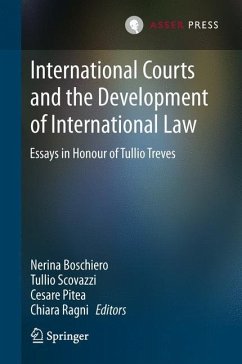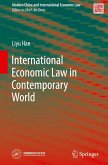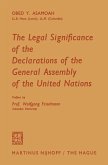This book contains a collection of essays by leading experts linked to the outstanding characteristics of the scholar in honour of whom it is published, Tullio Treves, who combines his academic background with his practical experiences of a negotiator of international treaties and a judge of an international tribunal. It covers international public and private law related to international courts and the development of international law.
Under Article 38 of its Statute, the International Court of Justice can apply judicial decisions only as a "subsidiary means for the determination of rules of law". However, there are many reasons to believe that international courts and tribunals do play quite an important role in the progressive development of international law. There are a number of decisions which are inevitably recalled as the first step, or a decisive step, in the process of the formation of a new rule of customary international law. In these cases, can the judge be considered as a subsidiary of others? Are these cases compatible with the common belief that a judge cannot create law? Is this a peculiarity of international law, which is characterized by the existence of several courts but the lack of a legislator? Do decisions by different courts lead to the consequence of a fragmented international law? This volume provides the reader with an elaboration of various questions linked to the legislative role of courts.
In their choices of subjects, some contributors have taken into account the general aspects of the development of international rules through court decisions or specific sectors of international law, such as human rights, international crimes, international economic law, environmental law and the law of the sea. Others have chosen the subject of the rules on jurisdiction and procedure of international courts. The question of the courts' role in the development of areas of law different from public international law, namely private international law and European Union law, has also been considered.
The information and views contained in this book will be of great value to academics, students, judges, practitioners and all others interested in the public and private international law aspects of the link between international courts and the development of international law.
Under Article 38 of its Statute, the International Court of Justice can apply judicial decisions only as a "subsidiary means for the determination of rules of law". However, there are many reasons to believe that international courts and tribunals do play quite an important role in the progressive development of international law. There are a number of decisions which are inevitably recalled as the first step, or a decisive step, in the process of the formation of a new rule of customary international law. In these cases, can the judge be considered as a subsidiary of others? Are these cases compatible with the common belief that a judge cannot create law? Is this a peculiarity of international law, which is characterized by the existence of several courts but the lack of a legislator? Do decisions by different courts lead to the consequence of a fragmented international law? This volume provides the reader with an elaboration of various questions linked to the legislative role of courts.
In their choices of subjects, some contributors have taken into account the general aspects of the development of international rules through court decisions or specific sectors of international law, such as human rights, international crimes, international economic law, environmental law and the law of the sea. Others have chosen the subject of the rules on jurisdiction and procedure of international courts. The question of the courts' role in the development of areas of law different from public international law, namely private international law and European Union law, has also been considered.
The information and views contained in this book will be of great value to academics, students, judges, practitioners and all others interested in the public and private international law aspects of the link between international courts and the development of international law.








